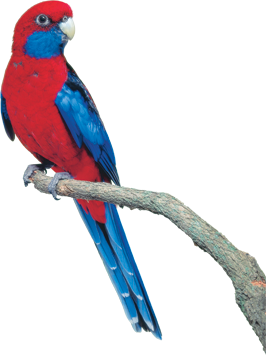Bird Care
VITAMIN E
Adequate vitamin E in the diet is essential for your birds' good health and longevity.
Vitamin E is a member of the fat soluble group of vitamins. It is a mixture of several related compounds produced by plants, known as tocopherols. Vitamin E interacts with other nutrients and has a far-reaching effect on the whole metabolism process.
Functions in the body
Vitamin E helps to maintain the integrity of cell membranes throughout the body. The membranes surrounding cells are made up of polyunsaturated fatty acids, which are easily destroyed by oxidation. Oxidation produces free radicals, highly reactive molecule fragments that destroy other molecules when they come into contact with them. Being fat soluble, vitamin E accumulates in the cell membranes, and the body's fat deposits. Vitamin E works together with other antioxidants such as the trace element selenium, vitamin C and certain amino acids, to protect the body against the adverse effects of free radicals and molecular oxygen. Vitamin E also protects fats and vitamin A in the body from being destroyed by free radicals.
Adequate vitamin E is also required to maintain the body's immune defences. Supplementation of poultry diets with vitamin E can enhance their immune response. Researchers have shown that vitamin E improves the ability of turkeys to fight common bacterial infections. They found that chickens and turkeys that receive added vitamin E develop more infection-fighting cells called lymphocytes. The increased number of these cells appears to help protect against diseases that can be carried by birds.
Vitamin E also improves your birds' responses to stress. Research has shown that a dietary supplement of 250 mg vitamin E/kg provided before, during and after heat stress alleviated, at least in part, the adverse effects of chronic heat stress in laying hens.
Vitamin E is also required for normal growth patterns in young birds and fertility in adult birds. Vitamin E is also necessary for the normal digestion of polyunsaturated fats.
Sources of Vitamin E
The best food sources of Vitamin E are wheat germ, wheat germ oil, almonds, alfalfa, hazelnuts, peanuts, peanut butter, and whole grains. Vitamin E deficiencies are rarely seen in birds on seed-based diets. Vitamin E is very sensitive to heat, oxygen and freezing, and is best absorbed with fats.
The dietary requirement for vitamin E is closely linked to the dietary intake of polyunsaturated fatty acids, as this can affect the composition of cell membranes. Consumption of rancid fats e.g. wheatgerm oil left in wheat, will use up vitamin E in the body and may create a deficiency, even when dietary intake is adequate.
Signs of Vitamin E Deficiency
A lack of vitamin E causes degeneration of muscles, a condition known as muscular dystrophy. Muscles anywhere in the body can be affected, including the heart muscle and gizzard muscle. Typically the affected bird will develop weak and splayed legs, and if the gizzard muscle is weakened, the bird may pass undigested seed. Oedema is another symptom of vitamin E deficiency in birds, with fluid building up under the skin around the neck, wings or breast muscle. Brain damage can also occur, causing lack of coordination, head retraction, outstretched legs and flexed toes. Eggs may have low hatchability due to a weakness in the muscles that the chicks use for pipping. Infertility is another common effect of vitamin E deficiency.
Effects of Excess Vitamin E
It is important to remember that all the fat-soluble vitamins, including vitamin E, accumulate in the body and may cause toxic effects if taken in an excessive amount over long periods. However, cases of vitamin E toxicity have rarely been reported. Symptoms of nausea and intestinal distress have been observed in laboratory animal studies. At very high doses, Vitamin E antagonizes other fat-soluble vitamins, and may lead to impaired bone mineralization and reduced hepatic storage of Vitamin A, as well as coagulation disorders.
Despite thorough research in humans and laboratory animals, there is no evidence that giving doses of Vitamin E far above the normal dietary requirements provides extra health benefits.
